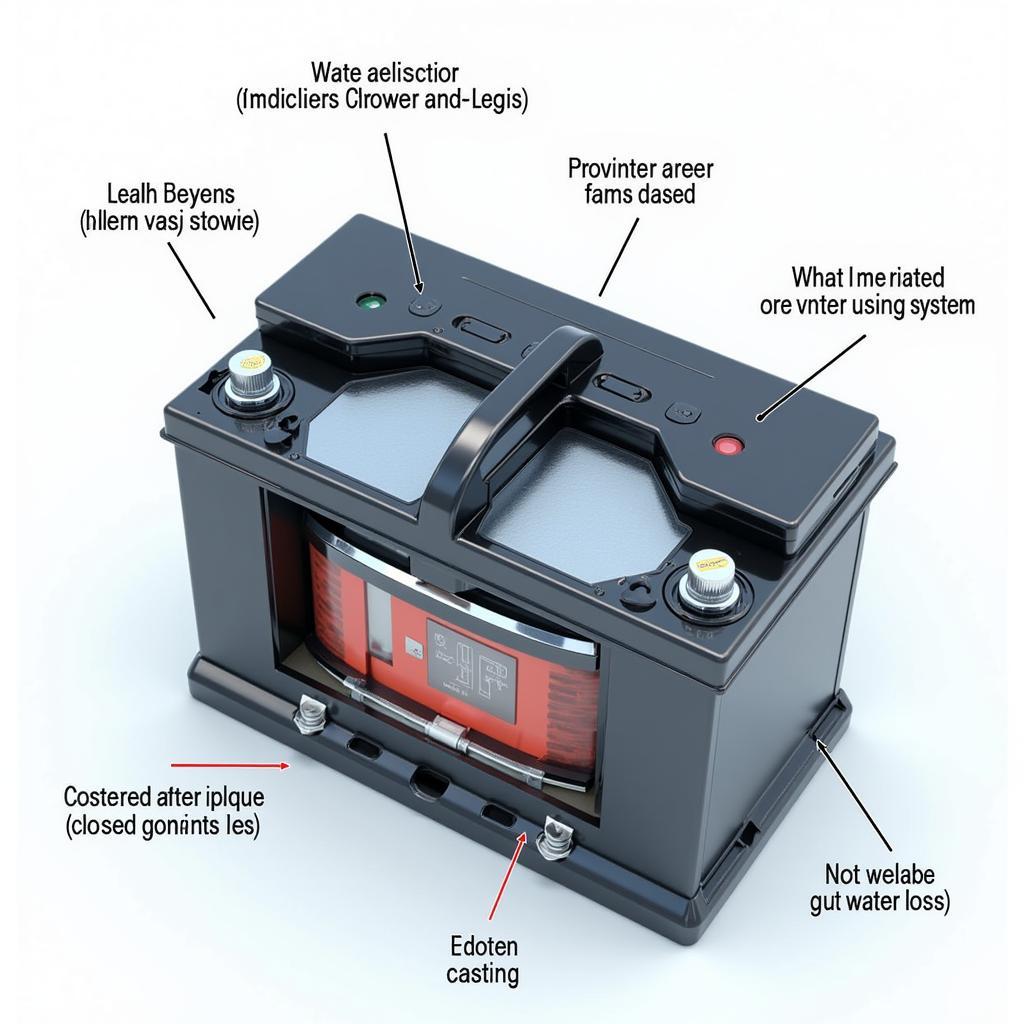Maintenance Free Batteries For Cars have become increasingly popular due to their convenience and longevity. But what exactly does “maintenance free” mean, and are these batteries truly free from any upkeep? This guide will delve into the world of maintenance free car batteries, exploring their advantages, disadvantages, and how they compare to traditional batteries. low maintenance vs maintenance free car battery
What Are Maintenance Free Car Batteries?
Maintenance free batteries, often referred to as “sealed” or “valve-regulated lead-acid” (VRLA) batteries, are designed to require minimal to no intervention throughout their lifespan. Unlike conventional batteries, they don’t typically require topping off with water. This is achieved through a sophisticated internal design that recombines the gases produced during charging, minimizing water loss.
 Internal Structure of a Maintenance-Free Car Battery
Internal Structure of a Maintenance-Free Car Battery
How Do Maintenance Free Batteries Work?
The secret lies in the battery’s sealed construction and the use of calcium or lead-calcium alloys in the plates. These alloys help reduce water loss during charging. Additionally, the oxygen produced at the positive plate is recombined with hydrogen at the negative plate, forming water and further minimizing the need for refills.
Advantages of Maintenance Free Batteries
- Convenience: The most obvious benefit is the lack of maintenance. You don’t have to worry about checking water levels or adding distilled water.
- Longer Lifespan: Maintenance free batteries generally have a longer lifespan than traditional batteries, thanks to their advanced design and construction.
- Spill-Proof Design: The sealed construction prevents acid spills, making them safer to handle and transport.
- Improved Vibration Resistance: These batteries are often more resistant to vibration, which can be a significant factor in automotive applications.
Disadvantages of Maintenance Free Batteries
- Higher Initial Cost: While they offer long-term value, maintenance free batteries typically have a higher upfront cost compared to conventional batteries.
- Sensitivity to Overcharging: These batteries are more susceptible to damage from overcharging, making it crucial to have a properly functioning charging system.
- Difficult to Diagnose Issues: Since you can’t open them to check electrolyte levels, diagnosing problems with a maintenance free battery can be more challenging.
Maintenance Free Batteries vs. Low Maintenance Batteries
It’s important to distinguish between “maintenance free” and “low maintenance” batteries. low maintenance vs maintenance free car battery Low maintenance batteries might still require occasional water top-ups, albeit less frequently than traditional batteries. Maintenance free batteries, on the other hand, are designed to be truly hands-off.
How to Extend the Life of Your Maintenance Free Battery
Even though they are labeled “maintenance free,” you can take some steps to maximize their lifespan. Ensure your car’s charging system is working correctly, avoid deep discharges, and keep the battery terminals clean.
John Thompson, a certified automotive technician with over 20 years of experience, advises, “A well-maintained charging system is critical for the health of any car battery, especially maintenance free ones. Regular checks can prevent premature failure.”
Are Maintenance Free Batteries Right for Your Car?
If you prioritize convenience and longevity and are willing to pay a slightly higher initial price, then a maintenance free battery is a good choice. However, if you’re on a tight budget and are comfortable with occasionally checking and topping up your battery, a low-maintenance or traditional battery might be more suitable.
Choosing the Right Maintenance Free Battery
When selecting a maintenance free battery, consider factors like group size, cold cranking amps (CCA), and reserve capacity. Consult your car’s owner’s manual or a qualified mechanic to determine the correct specifications for your vehicle.
Conclusion
Maintenance free batteries for cars offer significant advantages in terms of convenience and lifespan. By understanding their characteristics and following the recommended practices, you can ensure your maintenance free battery provides reliable performance for years to come. Remember to check our articles on what maintenance is required on electric cars and do electric cars need maintenance like oil changes. For further assistance, don’t hesitate to contact AutoTipPro at +1 (641) 206-8880 or visit our office at 500 N St Mary’s St, San Antonio, TX 78205, United States.
FAQ
-
Do maintenance free batteries ever need water? Generally, no. They are designed to operate without needing water top-ups.
-
How long do maintenance free car batteries last? They typically last 3-5 years, sometimes even longer with proper care.
-
Can I jump-start a car with a maintenance free battery? Yes, you can, but follow the correct procedure to avoid damage.
-
What causes a maintenance free battery to fail? Common causes include overcharging, deep discharges, and extreme temperatures. america’s car maintenance knowledge
-
How can I tell if my maintenance free battery is bad? Signs include slow cranking, dim headlights, and electrical problems. car maintenance donnybrook
-
Are maintenance free batteries more expensive? Yes, they typically have a higher initial cost than conventional batteries.
-
Are maintenance free batteries better for the environment? They can be considered more environmentally friendly due to their sealed construction, which prevents acid spills.





Leave a Reply